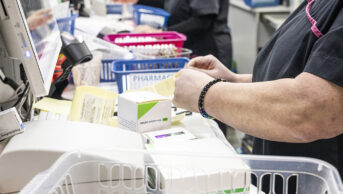
Courtesy of Helen Pinney
At Argyle Health Group I lead a pharmacy team that delivers prescription and medication services to a number of GP practices and care homes in West London.
09:00 — start
My official work day tends to start around 9:00, but I will usually have checked in with my team and run any issues and ideas past my line manager before this.
Until recently, I had a long commute so my administrative work would usually be done on the train. These days, I get it done before I leave the house so I can concentrate on the day ahead.
As pharmacy technicians, we are able to keep an eye on patient monitoring and spot potential need for review
The bulk of my time is spent on prescription processing, which is traditionally the job of a receptionist or member of the administrative team in a GP surgery. We are now seeing more and more pharmacy technicians take on this role. As we have a better idea of medicines, we are able to keep an eye on patient monitoring and spot potential need for review. We can thoroughly check that each patient has had any necessary, recent blood tests and reviews (and order them if not), and highlight if any action needs to be taken by the prescribing pharmacist. We work within a strict protocol and everything we do is checked off by at least one prescribing pharmacist.
Taking over prescription management in this way has freed up GP time enormously — an hour a day in many cases — and it appears to be improving patient access and experience.
14:00
Part of my role is helping oversee our team of pharmacists, pharmacy/prescribing technicians, preregistration pharmacists and students. We train a lot of students so it is important to make sure that everybody is in the right place at the right time, and knows where to go and who to ask if they need help. This happens frequently, which I’m happy about, as I like to drill into people the attitude of asking for help even if they are the tiniest bit unsure.
I love this part of my job as I can see our summer students and preregistration pharmacists grow and thrive in this fast-paced environment. It is a steep learning curve, but it is worth it!
14:30
I also help the surgeries meet their targets in terms of audits and reviews, which is obviously beneficial to our patients as they get that extra bit of support, and I get to learn about a condition or medicine in a way I may not have before. I have a growing timetable of audits which I like to keep on top of so that our patients are receiving the best care we can provide.
15:30
In the afternoons, my focus tends to switch to care homes work. Over the past couple of years, I have been helping our pharmacists when they attend care homes. I started slowly with storage and waste audits, and as I attended more frequently I got to know staff and residents. My responsibilities have increased to delivering training to staff, assisting and advising on medication-related concerns, such as swallowing issues, ethical matters surrounding ability to provide consent, and some medicines reviews.
Attention to detail is an inherent trait every pharmacy technician should hold, and this is even more so when caring for older people
The communication between general practice, community pharmacy, hospital pharmacy, care homes and even local clinical commissioning groups is so much greater when you have a pharmacy technician regularly visiting a care home. One of the most satisfying parts of my job is the feeling of connecting the dots when you are able to follow a patient from community to care home to hospital and back again, ensuring the whole time that their medication needs are taken care of and that transfer of care is as seamless as possible.
18:30 — finish
I like to stay busy and I enjoy taking on a lot, but I’m learning the value of looking after myself and making sure I’m well rested. The phrase ‘you can’t pour from an empty cup’ is so very true, and particularly when you are a healthcare professional of any kind.
How to get a job as a pharmacy technician working in general practice and care homes
- The Pharmacy Integration Fund for medicines optimisation in care homes is beginning to be rolled out, so many care home opportunities are coming up for pharmacy technicians — look out for these;
- If you are already working in general practice, speak to any care homes you provide for and see if there is an opportunity for you to provide your skills in collaboration with the multidisciplinary team at the surgery and the home;
- If you work in community pharmacy and you provide care home services, consider arranging to meet with staff from the home and the GP surgery to find out if there are any gaps in communication that might be affecting the service.


